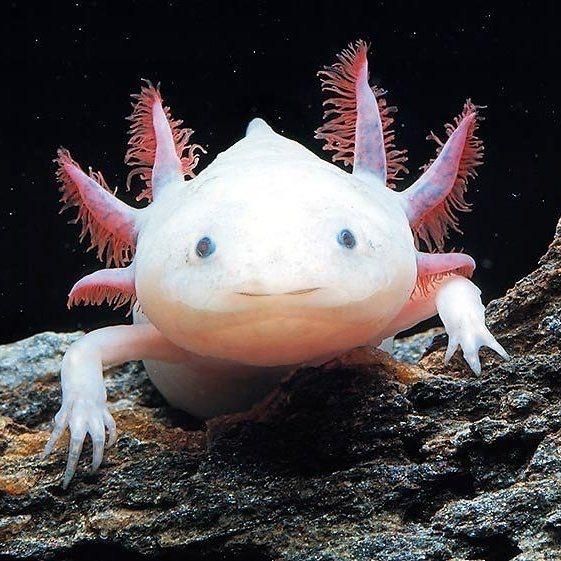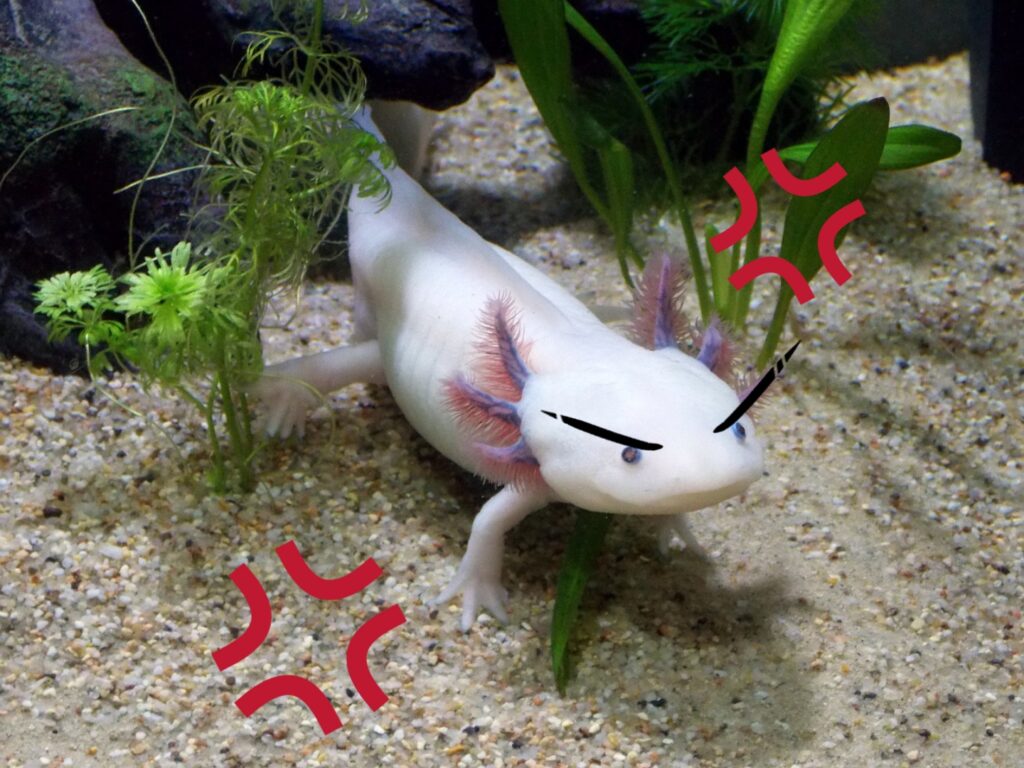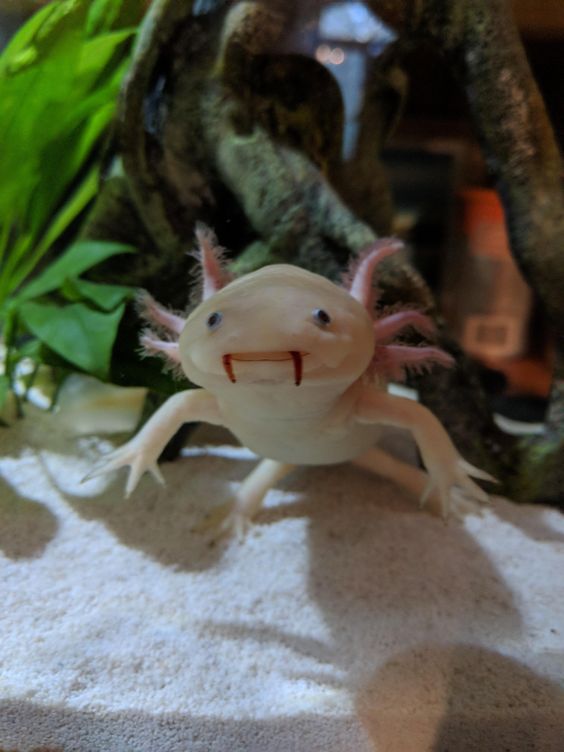
Axolotls, those curious aquatic creatures, are well-known for their underwater prowess. But can they live without water? The short answer is yes, but with some important caveats. Axolotls are primarily aquatic, meaning they spend the majority of their lives in water. However, they have an extraordinary ability to survive on land for short periods. This adaptation is essential because their native habitat in Mexico can experience fluctuations in water levels.”Can Axolotls Live Without Water”
How Long Can Axolotls Live on Land
Axolotls may venture onto land from time to time, but their terrestrial excursions are limited. The duration for which they can survive on land varies depending on several factors. Factors like humidity, temperature, and the individual axolotl’s health all play a role. In optimal conditions, they can endure on land for a few hours to a couple of days. However, extended exposure to a dry environment is detrimental to their well-being.
What are Axolotls?
To understand their ability to live without water, let’s start with the basics. Axolotls are a type of salamander, specifically the Mexican walking fish. They are remarkable creatures known for their aquatic lifestyle and neotenic characteristics, meaning they retain juvenile traits throughout their lives. Unlike other salamanders, axolotls never undergo full metamorphosis and remain aquatic, retaining their gills for breathing.
Axolotls’ Natural Habitat
Axolotls are native to the ancient water systems of Xochimilco and Chalco in Mexico. These habitats consist of shallow, freshwater lakes and canals, which are prone to seasonal fluctuations in water levels. It’s in this dynamic environment that axolotls have evolved their unique adaptations, allowing them to survive both underwater and on land.
Axolotls’ Adaptation to Land
Axolotls’ ability to survive on land is partly due to their remarkable adaptability. They have rudimentary lungs that allow them to gulp air at the water’s surface when needed. Additionally, their skin contains mucous glands that help them retain moisture during their terrestrial sojourns. While not as efficient as their aquatic respiration, these adaptations allow them to endure brief spells away from water.
How Long Can Axolotls Survive on Land?
Axolotls, those enigmatic aquatic beings, possess a surprising but limited ability to survive on land. This remarkable adaptation is a testament to their resilience, but it comes with a time constraint. If you’ve ever wondered how long axolotls can endure away from their watery abode, read on for a closer look at this intriguing facet of their existence.
The duration for which axolotls can survive on land varies based on a range of factors, with the most critical ones being humidity, temperature, and the overall health of the individual axolotl.
1. Humidity: Axolotls are equipped with delicate, permeable skin. When exposed to the dry air of a terrestrial environment, they can quickly become dehydrated. To maximize their time on land, it’s essential to provide a high level of humidity in their surroundings. This can be achieved by maintaining a damp substrate or adding a moist hideout to their enclosure.
2. Temperature: Temperature plays a pivotal role in an axolotl’s ability to survive on land. Lower temperatures are generally more favorable for extended survival periods. Cooler conditions reduce their metabolic rate, slowing down their need for oxygen and water. Conversely, higher temperatures can expedite dehydration and limit the time they can spend away from water.
3. Individual Health: The overall health of the axolotl is another determinant of how long they can survive on land. Healthy axolotls tend to have greater resilience. Any pre-existing health issues or stress can shorten their time out of water.
In optimal conditions, axolotls can endure on land for a few hours to a couple of days. However, it’s crucial to remember that their primary habitat is water, and they are not truly adapted for terrestrial life. Prolonged exposure to a dry environment can be detrimental to their well-being, leading to stress, dehydration, and potentially serious health problems.
Can Axolotls Breathe Out of Water
Axolotls, often likened to nature’s aquatic oddities, have a breathing mechanism that sets them apart. But can axolotls breathe out of water? This question delves into the extraordinary respiratory abilities of these amphibians. Let’s dive in to understand how axolotls manage to draw breath when submerged in their watery realm.
Axolotls, whether copper axolotl or Dirty Lucy Axolotls, are primarily aquatic and absorb oxygen through their gills. While they can briefly emerge from water, extended periods out of water can stress them. Adequate tank conditions, including proper water parameters, are essential to ensure their well-being and ability to breathe comfortably.
Axolotls’ Breathing Mechanism
To comprehend axolotls’ ability to breathe both in and out of water, it’s essential to grasp their breathing mechanism. Like many amphibians, axolotls primarily respire through their gills. In their aquatic habitat, oxygen is extracted from water as it passes over the gill filaments. This mechanism is highly efficient and allows them to thrive underwater.
Can Axolotls Breathe Air?
The intrigue deepens when we consider whether axolotls can breathe air. The answer is a resounding yes. Axolotls possess a unique adaptation – the ability to gulp air at the water’s surface. This behavior, known as “bubbling,” allows them to supplement their oxygen intake when necessary. It’s especially useful when oxygen levels in the water are low, or they find themselves in a situation where their gills can’t access sufficient oxygen.
How Do Axolotls Breathe on Land?
Now, the question arises: How do axolotls breathe when they are on land? The answer lies in their extraordinary adaptability. When axolotls venture onto land, they rely on the same bubbling mechanism to gulp air. This air intake helps them sustain themselves temporarily in a terrestrial environment. However, it’s important to note that their terrestrial excursions should be brief, as they are primarily aquatic creatures.
While axolotls have this unique ability to breathe both underwater and in the open air, it’s crucial to provide them with a habitat that prioritizes their aquatic needs. Prolonged exposure to a dry environment can be detrimental to their health, and they should always have access to water to thrive. Understanding their remarkable respiratory flexibility adds to the fascination of these captivating creatures and guides us in providing the best care for them.
Can Axolotls Walk on Land
Axolotls, with their endearing appearance and unique aquatic lifestyle, are not known for their prowess on land. They are primarily aquatic creatures, and while they can make brief forays onto land, their ability to walk on land is far from graceful. Let’s delve into this curious aspect of axolotls’ behavior and mobility.
Axolotls’ Locomotion
In their natural underwater habitat, axolotls exhibit graceful and efficient swimming. Their elongated bodies are adapted for life in the water, with webbed feet that facilitate precise movement. However, when it comes to land, their locomotion is considerably less agile.
Axolotls’ Movement on Land
Axolotls lack the anatomical features that enable most land-dwelling animals to walk or crawl effectively. Their limbs, while useful for swimming, are not well-suited for terrestrial movement. On land, axolotls typically employ a somewhat awkward method of “walking.” They push themselves forward with a rhythmic, snakelike movement of their bodies, often resembling a series of lurches.
Do Axolotls Need Water to Move?
The question arises: do axolotls need water to move? While they can move on land to some extent, water is their natural element and the medium in which they thrive. On land, their movements are limited, and they are far less agile compared to their underwater abilities. Their lack of terrestrial adaptation means that they are best suited for aquatic environments where their unique characteristics truly shine.
Can You Keep Axolotl Permanently Out of Water

The notion of keeping axolotls permanently out of water is a topic that sparks curiosity among those interested in these unique amphibians. While axolotls are known for their aquatic lifestyle, some may wonder if it’s possible to provide them with a terrestrial existence. Let’s explore the feasibility and implications of keeping axolotls out of water.
Assessing “What to Do if Your Axolotl is Floating” is crucial for their well-being. Check tank conditions, including the Best Tanks for Axolotl, and ensure proper water parameters. While brief periods out of water are normal, keeping an axolotl permanently out of water is not recommended. Extended exposure to air can harm their skin and overall health.
Keeping Axolotls as Pets
Axolotls have gained popularity as captivating and exotic pets. Their unusual appearance and endearing behaviors make them intriguing additions to home aquariums. However, it’s essential to understand that axolotls are primarily aquatic creatures. While it is possible to create semi-aquatic setups for them, permanently keeping them out of water raises ethical and practical considerations.
Creating a Suitable Habitat
To provide axolotls with the best care, it’s essential to create a suitable habitat that mimics their natural environment. This includes maintaining clean, well-filtered water with appropriate water parameters. Axolotls also need hiding spots and a substrate that won’t harm their delicate skin. While semi-aquatic setups are possible, they should always include access to water.
Is It Ethical to Keep Axolotls Out of Water Permanently?
The ethical aspect of keeping axolotls permanently out of water is a critical consideration. Axolotls have evolved to be aquatic creatures, and their biology is adapted to life in the water. Permanently depriving them of their natural habitat can cause undue stress and harm. It’s generally considered unethical to keep axolotls out of water permanently, as it goes against their inherent needs and instincts.
Ensuring Axolotls’ Health and Well-being
Ultimately, the primary concern when caring for axolotls is ensuring their health and well-being. While they can tolerate brief periods out of water, providing them with a permanent terrestrial existence is not conducive to their long-term health. It’s crucial to prioritize their aquatic needs, maintain appropriate water conditions, and offer a suitable environment to thrive.
FAQs
1: Can Axolotls Survive on Land?
Answer: Axolotls are primarily aquatic animals and are not adapted for a terrestrial lifestyle. While they can survive for a limited time on land, they require water to thrive.
2: How Long Can Axolotls Stay Out of Water?
Answer: Axolotls can survive on land for a few hours to a couple of days, depending on various factors such as humidity and temperature. However, prolonged exposure to a dry environment can be harmful to them.
3: Do Axolotls Need Water to Breathe?
Answer: Yes, axolotls primarily breathe through gills in water. While they can gulp air at the surface for short periods, they rely on aquatic respiration.
4: Can Axolotls Walk on Land?
Answer: Axolotls are not well-suited for walking on land. Their limbs are adapted for swimming, and they move clumsily on land, mainly by pushing themselves forward.
5: Can You Keep Axolotls as Terrestrial Pets?
Answer: While it is possible to keep axolotls in semi-aquatic setups, they are not recommended as permanent terrestrial pets. They should have access to water for their well-being.
6: How Can I Create a Suitable Habitat for Axolotls?
Answer: To provide a suitable habitat for axolotls, you’ll need an aquarium with clean water, proper filtration, and hiding spots. Ensure the water quality is optimal for their health.
7: Is It Ethical to Keep Axolotls Out of Water Permanently?
Answer: Keeping axolotls out of water permanently is generally considered unethical, as it goes against their natural habitat and instincts. It can lead to stress and health issues for the axolotls.
8: Can Axolotls Survive in a Semi-Aquatic Setup?
Answer: Axolotls can be kept in a semi-aquatic setup with access to both land and water, as long as their needs for aquatic life are met.
9: What Should I Do If My Axolotl Spends Time on Land?
Answer: If your axolotl spends time on land, ensure it has a way to return to the water. Monitor its behavior and keep the environment suitable for its aquatic needs.
10: What Are the Signs of Stress in Axolotls?
Answer: Signs of stress in axolotls may include abnormal behavior, loss of appetite, and changes in coloration. Ensure their habitat is suitable to minimize stress.
Conclusion
In conclusion, the world of axolotls is a captivating one, filled with unique adaptations and curious behaviors. While these amphibians possess the extraordinary ability to survive temporarily on land and gulp air, it’s clear that their primary habitat and well-being are intrinsically tied to water.
The question of whether axolotls can be kept permanently out of water leads us to important considerations of ethics and practicality. It’s vital to remember that axolotls have evolved over millennia to thrive in aquatic environments, and permanently depriving them of water is not conducive to their health or happiness. While semi-aquatic setups are possible and can provide a glimpse into their terrestrial behaviors, axolotls should always have access to water for their long-term well-being.
With 3 years of devoted companionship alongside my aquatic friend, Bob, I’ve gained profound insights into the captivating world of fishkeeping. From understanding behavior to ensuring optimal health, my journey with Bob has enriched my expertise in all things aquatic.




Pingback: Is Sand OK for Axolotls? Types, Benefits, and Considerations - Fish Hue
Pingback: How Do I Know If My Axolotl Is Happy? [8 Signs of Happiness] - Fish Hue